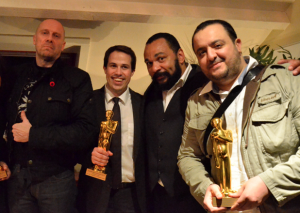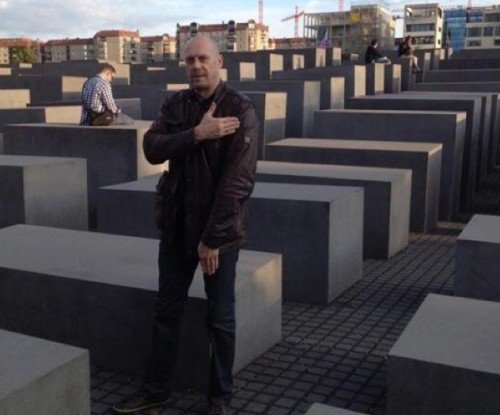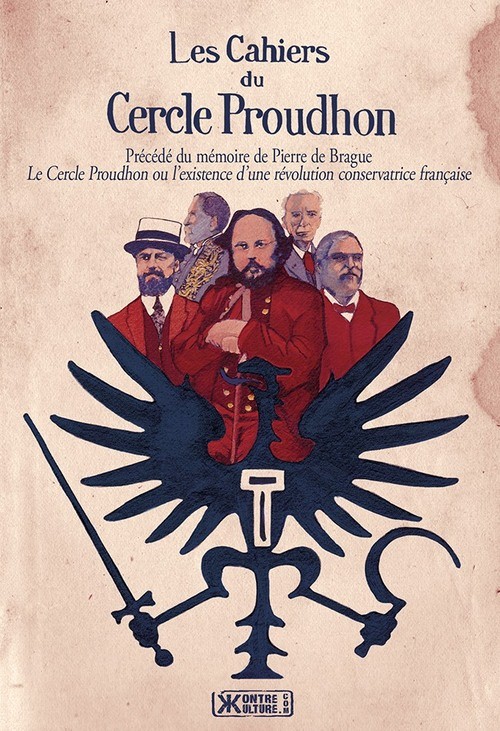Alain Soral FAQ, Part 3

E&R poster: “We want a French Chávez! Labour Left & Values Right, let us unite against imperialism! Equality and Reconciliation proudly supports President Hugo Chávez.”
What are Alain Soral’s relations with foreign nationalists?
Soral can be said to support all nationalists worldwide who are opponents of “the Empire.” He has previously called himself an “alter-nationalist,” modeled on the borderless-Left’s “alter-globalist.” Put another way: “Nationalists of the world, unite!”
In particular, Soral has said that Hugo Chávez’s brand of socialist, Christian, anti-racist and anti-imperialist nationalism is the closest to his own. In the Muslim world, Soral has supported Iran (especially Mahmoud Ahmadinejad’s fight against Israeli colonialism and against censorship of historical research), Syria, and Lebanon (particularly the national reconciliation between Christians and Muslims in Lebanon achieved by General Michel Aoun and Hezbollah). He also supports Vladimir Putin’s Russia as the leading rival to “the Empire.”
Soral opposes the various far-right Zionist nationalists, including the Dutch Party for Freedom and the English Defense League.
In terms of intellectuals, Comprendre l’Empire has been translated into Russian and published by Alexander Dugin, who evidently sees Soral as a significant figure. Soral has also promoted Dugin’s work in France. He has had good relations with Italy’s CasaPound, which in some ways ideologically seems to be the most similar foreign movement to E&R. Soral’s influence is unsurprisingly greatest however in the French-speaking world, including Belgium, Quebec, the Maghreb and francophone Black Africa.
Interestingly, it seems that Soral has largely independently reached conclusions similar to those of Anglo nationalists and populists. Kontre Kulture publishes translations of works by Ezra Pound (Labor and Usury), Anthony Sutton (Wall Street and the Rise of Hitler, Wall Street and the Bolshevik Revolution), Eustace Mullins (The Secrets of the Federal Reserve) and Douglas Reed (The Controversy of Zion). Amazingly, Soral was recently banned from publishing this last historical work by a lower court. Although the decision has been appealed, this act of brazen censorship may well stand. France has no First Amendment.
Soral is also the French-language publisher of foreign anti-Zionists including the ethnically Jewish Gilad Atzmon’s The Wandering Who? and the Muslim cleric Imran Hosein’s Jerusalem in the Quran.
What are Alain Soral’s view of race?

Alain Soral, Belgian politician Laurent Louis, Dieudonné M’balah M’balah and Franco-Maghrebi author Salim Laïbi
There is no indication that Soral has studied the copious North American literature on race. However, he is clearly not naïve: he has remarked on the morphotype of Black sportsmen, on the high number of Jewish Nobels and on “the myth of assimilation,” in contradiction with the FN’s official assimilationist line. This suggests he does not believe the mass of non-Europeans (particularly Muslims) can be made into generic Frenchmen like the ethnic French anytime soon. (This seems like such a self-evident point that one wouldn’t need to make it, yet it is the ruthlessly enforced official dogma of the politico-media regime.)
Soral’s goal of toppling Zionism and of reconciling France’s ethnic groups means that E&R does not post many videos or news on the Islamization and de-Europeanization of France and their consequences. (The blog Fdesouche (meaning “ethnic French”) does so however, and is one of the top five most-visited blogs in France.)
Practically, Soral fears two things for France: An ethnic civil war and importing the “clash of civilizations” into France. As such he is anti-immigration but sees those who attack Muslims and non-Europeans already in France as contributing to Zionist power and a civil conflict which could permanently wreck the Nation. Examples of this in action include Lebanon’s destruction by Israel and Serbia’s destruction by “the Empire.” He has had harsh words for those fantasizing of race war and ethnic cleansing from the safety of their keyboards:
It’s stuff for bar-room alcoholics. […] The guys who say this [that we should throw the Arabs and Blacks in to the sea] would be incapable of doing it. They’d be crying after two hours if they started doing it. […] Between ‘we need to stop all this,’ and what would need to be done in terms of violence and moral ugliness to do it, it’s not the same thing.
Admittedly, population transfers have not been a particularly uncommon thing in European history (the Greco-Turkish transfer after WWI, the ethnic cleansing of the Sudeten and East Prussian Germans after WWII, the flight of ethnic Europeans in Algeria in 1962), but such fury has only followed terrible, nation-ruining wars which no one can desire.
Soral has also argued that
if all the Muslims of France and all the Jews of France voted for the National Front, I’d be delighted. Because that would mean that these two communities will be reconciled on the idea of the Nation, and we will avoid the clash of civilizations and the civil war and even the world war which have been programmed. […]
The political alternative is not to know whether we’re going to kill or chase out all the Jews or kill or chase out all the Arabs. That’s not what it’s about. It’s about all the communities of France, which have been tribalized by a succession of political cowardice and mistakes, reconciling themselves on the French project. From this point of view I can be fraternal with Zemmour on certain topics. ‘We’re all French,’ that’s the idea. The association I preside over is called ‘Equality and Reconciliation’.
Soral might well agree with Greg Johnson’s interpretation of Oswald Spengler: that if one is part of a dynamic, expansive, growing people, one would not worry about assimilation of others. Soral has said France needs a “community rebalancing” in which Jews would be less influential and Africans/Muslims more so. Having minorities after all is not necessarily problematic so long as they respect the majority and do not overwhelm the country. Perhaps Soral believes, if the tide is stemmed, that the French core will eventually be able to absorb the new arrivals. In any case, Soral himself has never called himself a White nationalist, has rarely shown interest in Europe as such, and always refers to himself as a French nationalist.
Soral does say that he actively supports the nationalism of non-Europeans, but only if they leave France (notably the case of pan-Africanist Kemi Seba, with whom he has good ties). He has said that the children of foreigners in France could be deprived of their citizenship if they engage in Islamism or criminality.
Whatever one’s position on race, one must, at least for tactical reasons, attempt to answer the question: What’s in it for the non-Europeans who are your soil? In some cases the conflicts of interest may be irreconcilable. But if one is fighting against a common enemy, then alliances with non-Europeans may be possible. At the very least, Dieudonné and Soral have deprived the Establishment Left of the adherence of a growing number of non-Europeans.
What is Alain Soral’s position on the Jewish Question?

Alain Soral performs a quenelle in front of the Berlin memorial to the Jewish holocaust. He defended himself from the claim that he had “de-sacralized” the place saying: “It’s where the gays go to sodomize each other!”
If one watches a Soral video, one would be forgiven for thinking that his worldview can be summed by “Jews, Jews, Jews!” In fact, if one reads his works and articles, he is above all an enemy of the bourgeois world, rather than of Jewry as such. If he talks so much about Jews, it is because he is one of the few souls in the world willing to discuss the impact of elite Jewish over-representation and ethnocentrism, and the “double standards” that systematically arise from this in politics and media.
Jews get rather little attention in Comprendre l’Empire, although there are dark references to the harsh, tribal Old Testament values that permeate Judaism and Protestantism. Soral once said that the bourgeois was an “ersatz Jew,” someone for whom political, economic and cultural action with the wider society is instrumental, purely selfish, as opposed to softened by ethnic solidarity or concern for the national good.
Soral’s criticism of the organized Jewish community is entirely one of an ideological critique of Judaism-Zionism as a project for global supremacism through racism and deceit as expressed in the Tanakh and the Talmud. Whether or not he suspects any genetic predisposition among Jews for ethnocentrism (he has spoken of the “hatred” of Polish-origin Ashkenazim), his line is a Christian one that anyone can be redeemed: an individual may be predisposed towards this or that by his background and upbringing, but ultimately they can always choose salvation by sincerely joining the national community.
Soral clearly sees the absurdly disproportionate power that Jewish elites hold over Gentile politicians and intellectuals — moral, economic, cultural — as a fundamentally upside down. In a recent interview he reacted to a senior French journalist’s being incredibly impressed by Russian President Vladimir Putin during a face-to-face interview without pre-planned questions:
We saw the little [Jean-Pierre] Elkabbach — it’s my more racial-ethnic analysis — the little Sephardic Semite, submitting himself like a woman to someone who still represents Aryan virility, even if it’s Slavic. That is the just traditional hierarchy. When Putin, opens his mouth, Elkabbach shuts up. That’s how one should think of a properly-functioning world. Because one incarnates legitimate authority and virility and the other incarnates the role he should have kept since always, the role of an intermediary, of a courtier, or at best of a diplomat, like in the days when France was still France. […] [It] corresponds to the just hierarchy of cultures, I wouldn’t say of races, but of cultures.
This is I believe the most explicit he has been on his preferred outcome.
For Soral, the Judeo-bourgeois world is becoming deeply anti-human, effeminizing, based on the miscegenation and destruction of all nations and cultures, turning all human beings into interchangeable economic agents, simultaneously destroying both national cohesion (because of internal balkanization) and authentic international diversity (all submitting to the same faux globo-culture), with any substantive dissent severely punished.
In opposition to this vision, Soral wants multipolarity, ideological-political pluralism, human freedom and genuine diversity, preserved in a perpetual struggle by an alliance of free Nations against the Empire of the day (America today, perhaps China tomorrow).
Is Alain Soral of the Right?

From Alain Soral’s publishing house
Soral’s own sinuous political path, his combining of left- and right-wing themes, and his necessary crypsis (or obfuscation) in the face of regime persecution can make an ideological appraisal frustrating. Is there such a thing as “Soralism” and is it coherent?
Suffice to say that E&R is a movement of the French Third Position. Its orientation is suggested by Kontre Kulture’s recent republication of the rare Cahiers du Cercle Proudhon, an early twentieth-century periodical featuring both right-wing monarchist and left-wing syndicalist authors. E&R considers this proof of there having been “a French conservative revolution” in addition to the more famous German one. The short-lived movement’s name was inspired by the French anarchist, Judeophobe and anti-feminist Pierre-Joseph Proudhon, while its most prominent authors were disciples of the revolutionary theorist Georges Sorel and the monarchist nationalist Charles Maurras.
One could therefore fairly place Soral and E&R as part of the French New Right, although they reject the term “far-right” for its pejorative connotations and/or injurious intent. In France, the Left is still synonymous with moral superiority, and E&R can claim that it better defends the nobler left-wing goals (sovereignty, racial peace, anti-banksterism, social equity) than does the mainstream left.
Soral himself has said many times that, curiously for a Marxist, he is opposed to Enlightenment thinkers such as Voltaire, whom he considers rationalizers for bourgeois power. Additionally, he has said several times that “he is not a democrat” and is opposed to what he calls “market and opinion democracy,” which inevitably falls under plutocratic control because of Capital’s influence over media and political parties. He is clearly opposed to individualism as ultimately self-destructive and levelling; he is an inegalitarian who sees elites as needing to raise up the masses.
Soral seems to want some kind of monarchy (perhaps under the Le Pens?!) as the only political form which can resist plutocracy. He has said “the most Catholic King of France had two advantages: he was Catholic and he was French.” And in Comprendre l’Empire, citing René Guénon and Julius Evola’s “Tradition,” he writes of
[the need of] the subordination of this commercial materialism by the transcendental power of a hereditary caste, both religious and military. […] Thus, in light of this, we find among all serious opponents of modern democracy: from the integral nationalism of Charles Maurras to the Islamic Republic of Iran, and through the Black Order of the SS dear to Heinrich Himmler, this same attempt to check the power of money by the return to the absolute power of a both military and religious order.
At the same time, Soral has said that he highly respects Rousseau, whom he does not consider an Enlightenment thinker, and has expressed support for Étienne Chouard. The latter is an ultra-democratic activist who wants to establish a Constitution for France through a constitutional convention drawn by lot, a symptom of the seemingly endless and often self-destructive French quest for absolute democratic legitimacy and equality. Soral has called such constitutional debates “thrilling.”
Suffice to say that, beyond a ruthless critique of the System and an uncompromising defense of the Nation-State, Soral does not present a ready-made ideology for the new order, but is rather sparking the conversation.





Comments are closed.